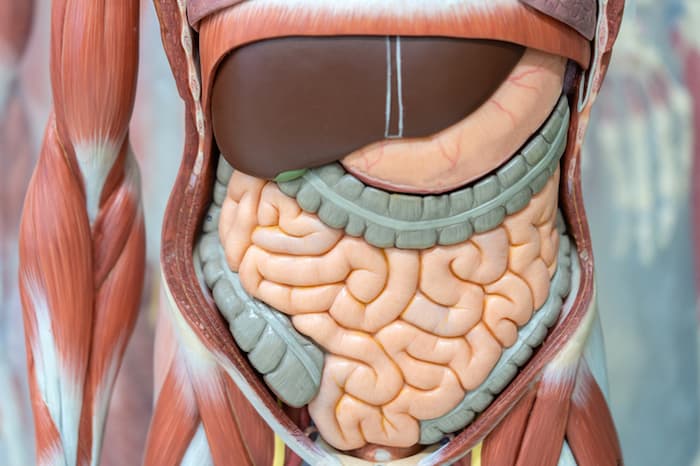- Calls to this hotline are currently being directed to Within Health or Eating Disorder Solutions
- Representatives are standing by 24/7 to help answer your questions
- All calls are confidential and HIPAA compliant
- There is no obligation or cost to call
- Eating Disorder Hope does not receive any commissions or fees dependent upon which provider you select
- Additional treatment providers are located on our directory or samhsa.gov
Eating Disorders and Correlating Digestive Problems
Eating disorders can affect every aspect of someone’s life. Setting aside the emotional and psychological impact of these disorders, the medical impact alone can be devastating. This article will explore the connection between disordered eating and digestive problems.
Effects of Eating Disorders on the Digestive System
Digestive issues are very common for people with eating disorders. There is a wide range of digestive symptoms that can occur as a result of disordered eating. These include:
- Heartburn
- Acid regurgitation
- Nausea
- Diarrhea
- Constipation
- Abdominal pain
- Fullness after eating even small amounts
- Bloating
- Muscle weakness in the esophagus and sphincter
- Kidney failure
- Bowel shutdown
- Difficulties swallowing [1,2]
There are also certain gastrointestinal conditions that can result from disordered eating. Some examples are:
- Gastroesophogeal reflux disorder (GERD): This happens when the muscles between the stomach and the esophagus become weakened. Stomach acid and partially digested food travel back up through the esophagus and can cause a burning sensation. Eventually this can create holes in the esophagus.
- Barrett’s esophagus: This happens as a result of self-induced vomiting and is actually a precursor to esophageal cancer. The stomach acid from vomit can cause holes in the esophagus.
- Cathartic colon: When someone abuses laxatives, eventually the colon can shut down. The bowels become dysfunctional
- Rectal prolapse: Chronic constipation can be very stressful on the excretory system. Constant straining can lead to a rectal prolapse, which is when the rectum protrudes through the anus
- Sialadenosis: This is the medical term for swollen parotid glands that results from self-induced vomiting. This can make someone’s cheeks puff up. [3]
In severe cases, some of these conditions can result in someone needing to have dialysis, colon surgery, or use a colostomy bag [2].
Related Reading
- Health Issues from Eating Disorders
- Adverse Effects on the Musculoskeletal System
- The Harm Eating Disorders Have on the Brain
- Respiratory Issues Due to Anorexia or Bulimia
- What Can Eating Disorders Do to the Heart?
- Digestions Issues from Anorexia and Bulimia
- Disordered Eating andthe Endocrine System
- How EDs Affect Your Hair, Nails and Skin
- What EDs Do to the Reproductive System
- Your Immune System and Eating Disorders
Can Eating Disorders Cause Stomach Problems?
Yes! It’s important to remember that the stomach is connected to other digestive organs. When one part of the system dysfunctions, it is likely to impact other parts of the digestive system. Different eating disorder behaviors can affect the stomach differently.
What Can Bulimia Do to Your Stomach?
People with bulimia struggle with cycles of binge eating and compensatory behaviors. One compensatory behavior that can really impact the stomach is self-induced vomiting.
Self-induced vomiting, also known as purging, can cause GERD. As mentioned above, GERD is when stomach acid and undigested food travel back up to the esophagus from the stomach. This certainly isn’t the only impact that purging can have on the digestive tract, but GERD is one of the main complications from this disordered behavior [2].
Binging can also have negative consequences on someone’s stomach. After binging, someone may experience abdominal pain and bloating due to the amount of food they consumed. Over time, this can shift someone’s perception of fullness [4].
Anorexia and Stomach Problems
Anorexia is an eating disorder characterized by severe food restriction in order to avoid gaining weight. Over time, the limited amount of food can delayed gastric emptying. This means that it takes a longer amount of time for food to move from the stomach to the small intestine. This can cause nausea, vomiting, and bloating [1].
Binge Eating Effects on Your Stomach
Binge eating can cause the stomach to over extend itself. If the stomach is overly full, it can make it difficult or impossible to empty out the food into the intestinal tract. This can lead to loss of blood flow to the stomach, which can damage or kill tissues. Another possible effect is that the stomach can rupture [3].
Can Eating Disorders Cause Liver Damage?
The liver plays a key role in the digestive system. Certain disordered eating behaviors can impact the digestive system, including the liver.
Can Bulimia Cause Liver Problems?
Behaviors associated with bulimia, primarily purging, laxative abuse, and binging, can damage the liver. Here are two main ways that these behaviors can negatively impact the liver:
- Laxative jaundice: When someone continually uses laxatives, their body becomes less sensitive to them. As a result, they have to start using more in order to get the same effect. The liver is responsible for breaking down drugs and filtering out toxins. Repeat laxative abuse can be stressful on the liver and this can lead to jaundice. Jaundice causes the skin and the white parts of the eyes to turn yellow.
- Fatty liver disease: Binge eating can cause the liver to store fat. This alone is problematic, but it can also lead to inflammation [5]
Liver Damage Caused by Anorexia
Anorexia can also damage the liver. Research shows that anorexia can cause inflammation in the liver and can cause an excess of liver enzymes [6]. This can be a sign that the liver isn’t functioning properly. This is more likely to be seen in individuals with severe malnourishment [6].
Will the Digestive System Recover After an Eating Disorder?
The digestive system can recover. Even more severe conditions like esophageal lesions or gastric ruptures can be repaired. Some conditions like these may require surgery or other medical procedures.
However, other symptoms such as chronic bloating or GERD can resolve itself during the recovery process. Sometimes this can be uncomfortable and may trigger someone to engage in disordered behaviors in order to relieve their discomfort.
It’s important to know that these symptoms are temporary. If someone continues to disrupt the body’s natural processes will only delay recovery.
It’s important to have support during the recovery process. A registered dietitian, gastroenterologist, and primary care doctor who are educated about eating disorders can help someone navigate any gastrointestinal symptoms.
Author: Samantha Bothwell, LMFT
Page Reviewed By:
Citations:
[1] Center for Clinical Interventions. (n.d). Gastrointestinal problems. Retrieved September 29th, 2021 from https://www.cci.health.wa.gov.au/-/media/CCI/Mental-Health-Professionals/Eating-Disorders/Eating-Disorders—Information-Sheets/Eating-Disorders-Information-Sheet—17—Gastrointestinal-Problems.pdf
[2] GI Alliance (2020, March 17). Eating disorders and GI problems: Understanding the connections. Retrieved September 29th, 2021 from https://gialliance.com/eating-disorders-and-gi-problems-understanding-the-connections/
[3] Mahoney, B. (2017, July 5). Eating disorders affect digestive system. Multi-service Eating Disorder Association. Retrieved September 29th, 2021 from https://www.medainc.org/eating-disorders-affect-digestive-system/
[4] Santonicola, A., Gagliardi, M., Pier Luca Guarino, M., Siniscalchi, M., Ciacci, C., & Iovino, P. (2019). Eating disorders and gastrointestinal diseases. Nutrients, 11(3038), 1-17.
[5] Rister, R. (n.d). 4 things you should know about liver damage and eating disorders. SteadyHealth. Retrieved September 29th, 2021 from https://www.steadyhealth.com/articles/4-things-you-should-know-about-liver-damage-and-eating-disorders
[6] Bridet, L., Martin, J. J., & Nuno, J. L. (2014). Acute liver damage and anorexia nervosa: A case report. The Turkish Journal of Gastroenterology: The Official Journal of Turkish Society of Gastroenterology, 25(2), 205–208.
Author: Samantha Bothwell, LMFT
Page Last Reviewed and Updated on October 13, 2021 by Jacquelyn Ekern MS, LPC




